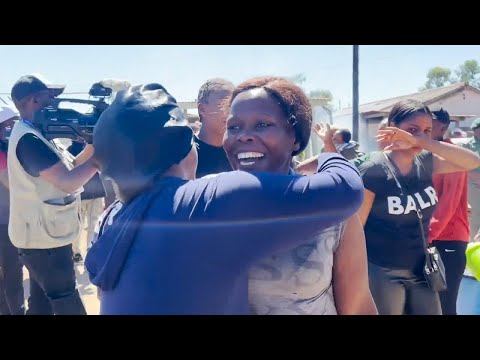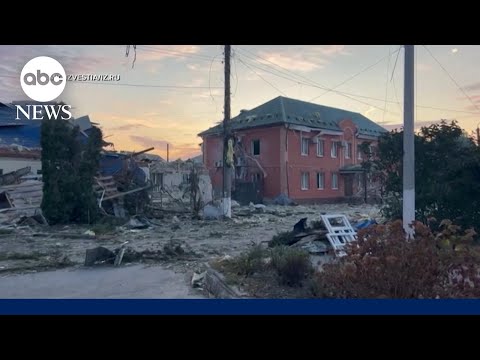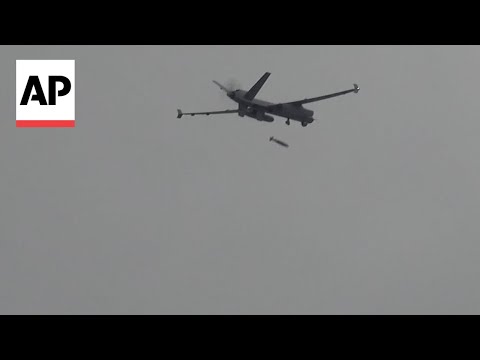(18 Apr 2024)
RESTRICTION SUMMARY:
ASSOCIATED PRESS
Harare, Zimbabwe – 18 April 2024
1. Various of male prisoners walking out of prison gates after being freed
2. Freed prisoner celebrating
3. Freed prisoner chanting and praising President Emmerson Mnangagwa
4. Prisoners on the back of truck chanting thanks to Mngangagwa
5. Wide of female prisoners walking out of prison gates
6. SOUNDBITE (Shona) Simbarashe Chimonyo, released prisoner:
"The most important thing I have learnt is patience. And in life you have to wait as things will happen at the right time. In terms of skills, we learnt to make bags and sew. God knows why he put me in jail and he also knows I was released earlier. So I am grateful and happy."
7. Wide of released prisoner Evans Makere embracing woman
8. SOUNDBITE (Shona) Evans Makere, released prisoner:
"It was not a good place for me to be in, leaving my children and when I was committing crime I was not thinking clearly and now I am back to my senses. I want to thank the president for releasing us from this place and showing leniency. My advice to those outside is to stop selling drugs."
9. Wide of released female prisoners seated outside prison gates
10. Wide of sign behind barbed wire fence reading (English) "Chikurubi Female Prison Clinic"
11. Wide of female prisoners behind barbed wire fence
STORYLINE:
Zimbabwean President Emmerson Mnangagwa granted clemency to more than 4,000 prisoners, including some who were on death row, in an independence day amnesty on Thursday.
Zimbabwe marked 44 years of independence from white minority rule, which ended in 1980 after a bloody bush war.
The country’s name was changed from Rhodesia to Zimbabwe.
The presidential amnesty, the second in less than a year, benefits female, older and juvenile inmates, the terminally ill and some who were originally sentenced to death.
Those once on death row but who had their sentences commuted to life terms in previous clemency orders or through court appeals are to be freed provided they have been in prison for at least 20 years, according to the clemency order, which was announced on Wednesday and due to take effect on Thursday.
All female prisoners who had served at least a third of their sentence by independence day are being freed, as are juvenile inmates who have served the same period.
Prisoners age 60 and older who have served one-tenth of their sentences will also be released.
Mnangagwa also pardoned the blind and others with disabilities who have served a third of their sentence.
The prisoners are being released in batches across the country.
However, those jailed for “specified” offences that include sexual offences, robbery, public violence, unlawful possession of firearms, human trafficking and theft or vandalism of electricity and telecommunications infrastructure won’t benefit from the amnesty.
All death row prisoners who have been in jail for at least 10 years had their sentences commuted to life in prison under the amnesty.
Zimbabwe has more than 60 inmates on death row.
It wasn’t immediately clear how many of those had their sentences commuted to life under the amnesty.
Zimbabwe is one of more than a dozen countries in Africa and more than 50 across the world that have the death penalty, although the country’s last hanging was in 2005.
Mnangagwa says he supports abolishing the death penalty, a move which was backed by the Cabinet in February and is now awaiting approval from Parliament.
At the time, Zimbabwe had about 22,000 prisoners crammed into prisons with a capacity of 17,000.
Find out more about AP Archive: http://www.aparchive.com/HowWeWork
Twitter: https://twitter.com/AP_Archive
Facebook: https://www.facebook.com/APArchives
Instagram: https://www.instagram.com/APNews/
You can license this story through AP Archive: http://www.aparchive.com/metadata/youtube/b0b1e3d77e0744c0b9382450e9c6b913





